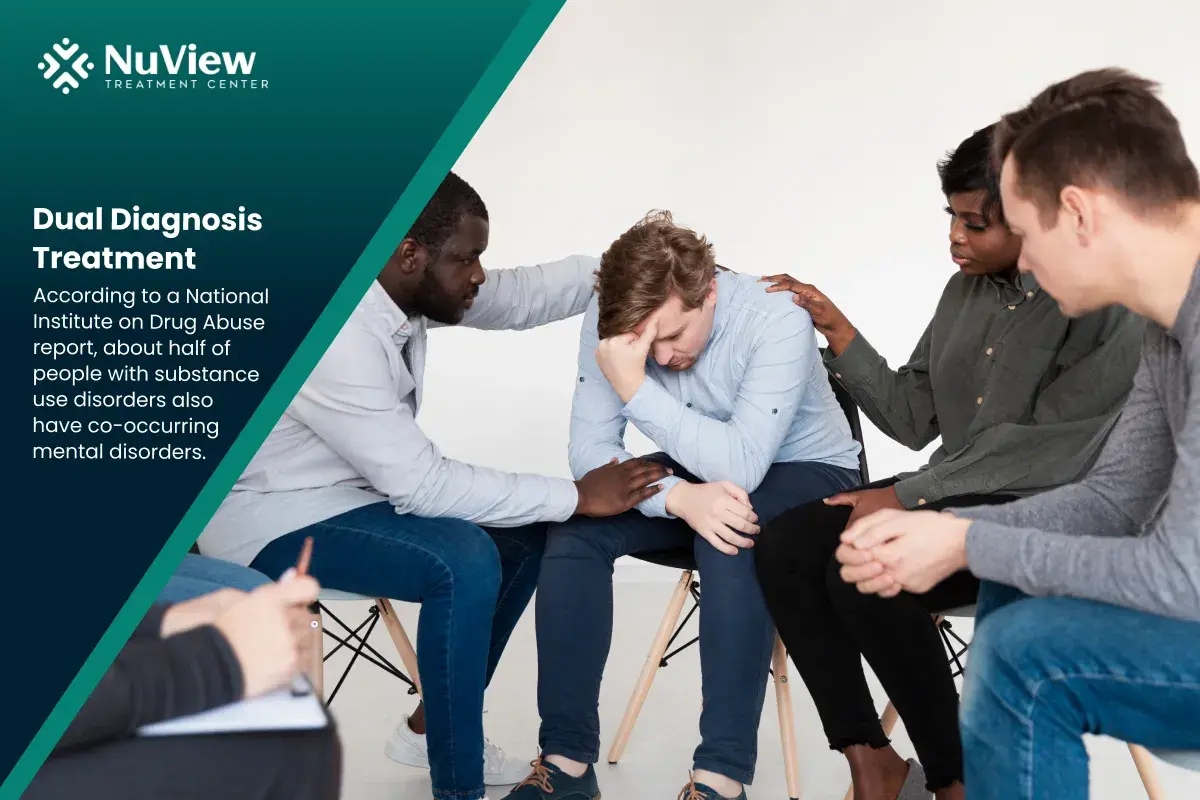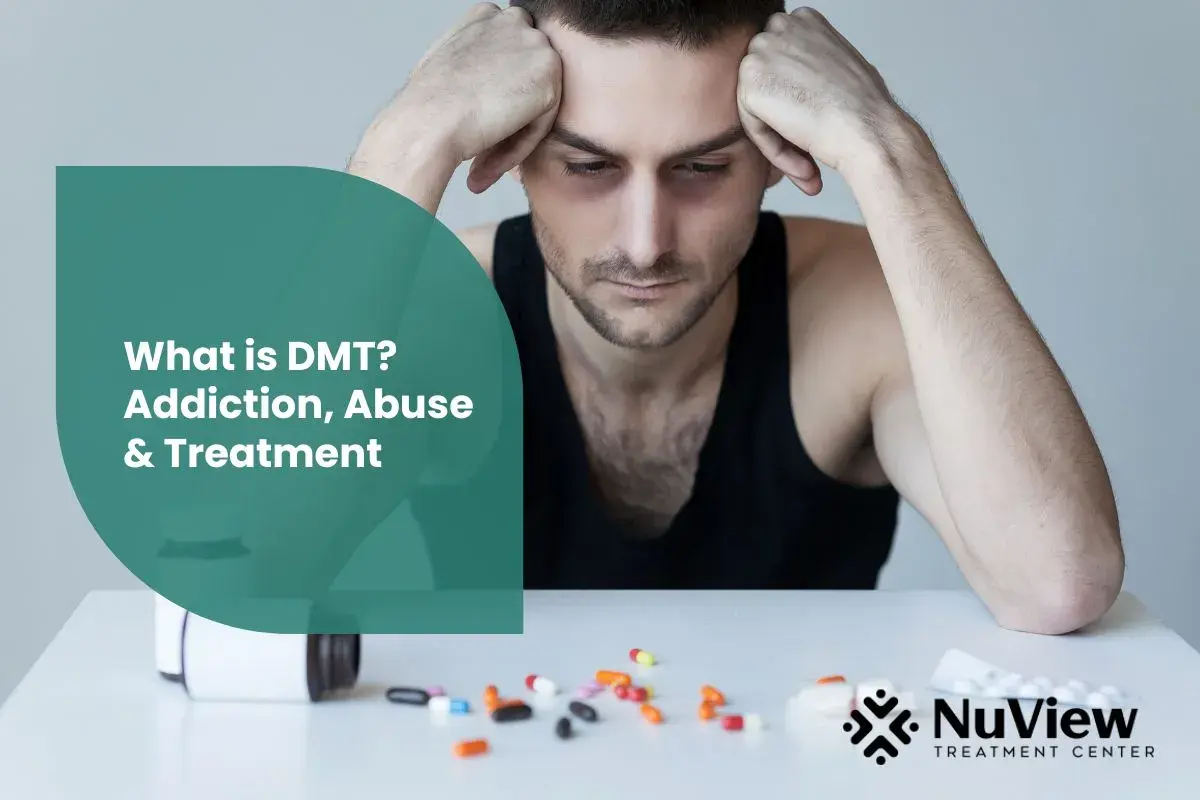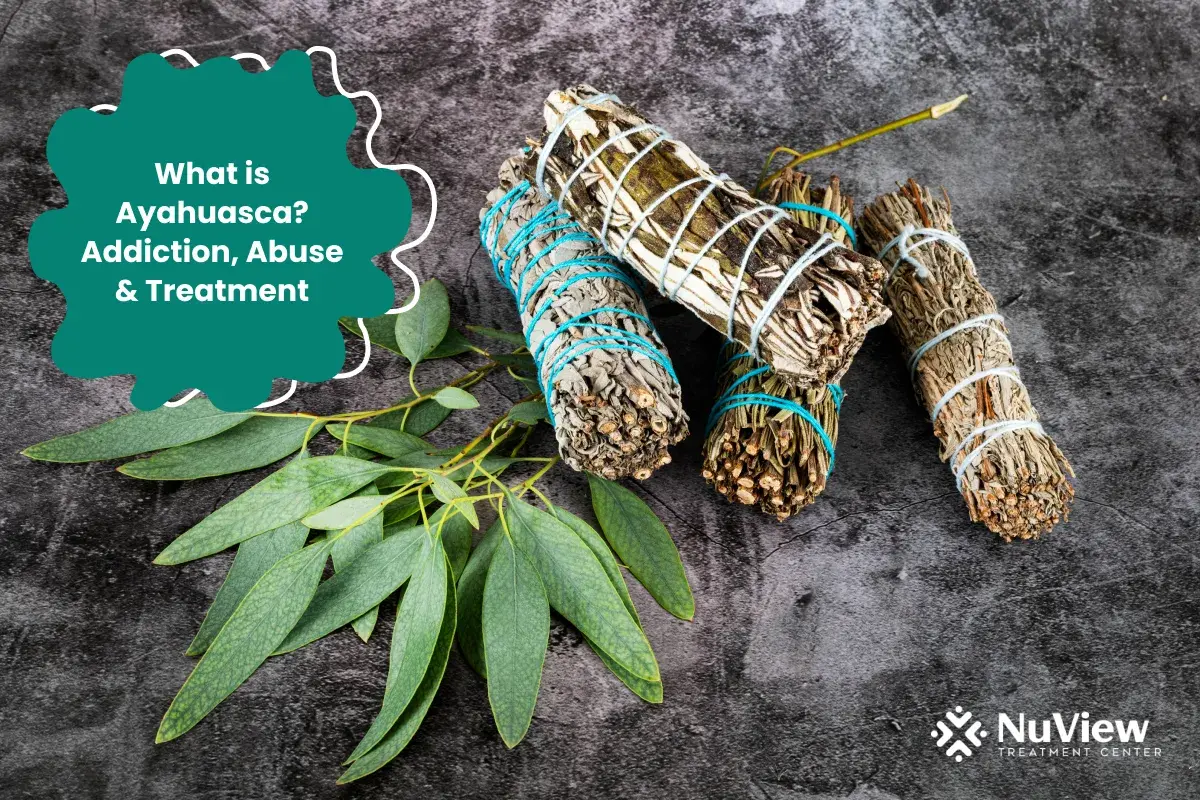Cocaine addiction can be hard to overcome, but effective treatments can help people recover and live a drug-free life.
How does Cocaine Work?
Cocaine hydrochloride is a powerful stimulant and an addictive drug that can severely affect the central nervous system and the body.
It increases dopamine levels in the brain, a neurotransmitter involved in reward, motivation, and pleasure. Dopamine is usually released in response to natural stimuli, such as food, sex, or exercise, and then recycled back into the neurons.
Cocaine blocks the recycling process, causing a buildup of dopamine in the synapses, the gaps between neurons. This leads to intense euphoria and a sense of well-being, making cocaine users want to repeat the experience.
Get Started With Nuview Treatment Center
Our dedicated professional staff is here to guide you or your loved one on the journey to lasting recovery, offering support every step of the way.
Dangers of Long-Term Cocaine Use Disorders

After long-term cocaine use, the brain adapts to the excess dopamine by reducing its sensitivity, making it harder to feel pleasure from natural stimuli or the same amount of cocaine.
This is called tolerance, meaning cocaine users must take more and more of the drug to achieve the desired effects. Cocaine users may also experience chemical dependency, leading to withdrawal symptoms when they stop using the drug, such as depression, anxiety, fatigue, and cravings.
Prolonged cocaine use disorders can cause medical complications that impair one’s health and quality of life.
Some of the dangers of long-term cocaine use include:
- Snorting cocaine can cause irritation, inflammation, bleeding, and ulceration of the nasal passages and the septum, the cartilage that separates the nostrils.
- Loss of smell, difficulty breathing, infections, and even nose collapse.
- Crack cocaine can also damage the teeth and gums due to poor oral hygiene, dry mouth, and teeth grinding.
- Smoking crack cocaine can cause lung damage, asthma, bronchitis, pneumonia, and respiratory failure.
- Increase the heart rate and blood pressure, constrict the blood vessels, and disrupt the heart rhythm.
- Chest pain, heart attack, constricted blood vessels, stroke, heart muscle inflammation, and aortic rupture.
- Cocaine use also reduces blood flow to the digestive system, causing ulcers, tears, perforations, and bleeding.
- Cocaine users may also lose their appetite and experience weight loss and malnutrition.
- Kidney failure due to rhabdomyolysis is when muscle tissue breaks down and releases toxins into the bloodstream.
- Liver damage due to hepatitis C infection from sharing needles or other drug paraphernalia.
- Brain structure and function changes affect cognition, memory, learning, attention, impulse control, and decision-making.
- Mood disorders like depression, anxiety, bipolar disorder, and psychosis.
Recovery and Maintenance for Cocaine Addiction
If you are struggling with cocaine addiction, you may feel hopeless and alone. You may think you can never quit or will always relapse. But there is hope.
Recovery from cocaine abuse and addiction is possible; many resources and strategies can help you stay sober and healthy.
Relapse Prevention Strategies
One of the most important aspects of recovery is relapse prevention. Relapse is common in substance use disorder but does not mean you've failed or can't recover.
Relapse is just a sign that you need to adjust your treatment plan, learn from your triggers and coping skills, and seek more support for your drug use.
Some of the relapse prevention strategies that can help you avoid or overcome drug use and cravings include:
- Avoiding high-risk situations that may tempt you to use cocaine, such as places, people, or events that are associated with your drug use.
- Having a plan for handling cravings, such as distracting yourself, calling a friend, or using a relaxation technique.
- Seeking professional help if you have co-occurring mental disorders contributing to your addiction, such as depression, anxiety, or trauma.
- Practicing self-care by eating well, sleeping enough, exercising regularly, and engaging in hobbies or activities that make you happy.
- Rewarding yourself for your achievements and celebrating your milestones in recovery.
- Being honest with yourself and others about your struggles with drug abuse and successes in recovery.
- Seeking help from a therapist, counselor, or coach who can help you work through the underlying issues fueling your drug abuse and provide guidance and feedback.
Support Groups and Community
Support groups are comprised of people who share similar experiences and challenges with drug abuse and who can offer emotional, practical, and spiritual support.
A supportive community can provide positive influences, opportunities, and resources to enhance your recovery.
Some examples of support groups and community resources for cocaine use disorder are:
- Narcotics Anonymous (NA) is a 12-step program following the same principles as Alcoholics Anonymous (AA) but focuses on drug addiction.
- SMART Recovery is a self-help program that uses cognitive-behavioral interventions to help you change your thoughts and behaviors related to drug abuse.
- Cocaine Anonymous (CA) is another 12-step program for people addicted to cocaine or other drugs.
- Online support groups: If you prefer to connect online, many online support groups and forums can offer you peer support and guidance.
Aftercare Planning for Cocaine Addiction Treatment
Another key aspect of recovery and maintenance for cocaine addiction is having an aftercare plan.
An aftercare plan is a personalized plan that outlines the steps you will take to prevent relapse and maintain your sobriety after completing a cocaine addiction treatment program.
An aftercare plan may include:
- Continuing behavioral therapies or counseling
- Taking medications approved or prescribed for substance use disorders
- Attending support groups or meetings
- Avoiding triggers for cocaine use
- Pursuing healthy activities
Family and Social Support
Having supportive people who understand and encourage your addiction treatment can make a huge difference in recovery.
Family and social support can provide the following:
- Emotional, practical, and financial assistance.
- Accountability.
- Motivation to avoid drug use.
- Your family members, significant other, friends, and peers can help you find healthy activities and hobbies to replace cocaine use.
However, not all family and social relationships are supportive or healthy.
Some people may have family members or friends who are also on cocaine or other drugs or are unsupportive or abusive. In these cases, limiting or ending contact with them or seeking professional help to deal with drug abuse may be necessary.
Dual Diagnosis Treatment

According to a National Institute on Drug Abuse report, about half of people with substance use disorders also have co-occurring mental disorders.
Dual-diagnosis treatment centers treat cocaine dependence and addiction alongside mental illness, ensuring comprehensive care.
Get Started With Nuview Treatment Center
Rehab for Cocaine Addiction: Choosing the Right Rehab Center
There are many factors to consider when looking for a cocaine treatment center or rehab, such as:
Outpatient Rehab & PHP
Outpatient treatment, on the other hand, allows you to live at home and attend cocaine treatment sessions at a clinic or addiction treatment center, usually for several hours a week.
Partial hospitalization: Here, clients are given more independence than in inpatient treatment programs. Partial hospitalization programs may be ideal for highly motivated patients to recover and/or have completed more intensive programs.
Cost and Insurance Coverage
Another important factor to consider is the cost of rehab and the insurance coverage available.
Cocaine treatment can be expensive, especially if you opt for inpatient treatment or a luxury facility. However, there are ways to reduce the cost or find financial assistance.
For example, depending on your plan and provider, you can use your health insurance to cover some or all expenses. You may also be able to find scholarships, grants, loans, or payment plans offered by the rehab center or other mental health services.
Contact your insurance company and ask about your coverage options and limitations. Contact the rehab center and ask about their fees, payment methods, and financial aid opportunities.
Why Choose NuView Treatment Center:
- Personalized Dual Diagnosis Care
- Evidence-Based Therapies
- Holistic Approach
- Expert Medical Team
- Strong Therapeutic Communities
- Insurance Assistance
Take the first step towards a drug-free life. Contact NuView Treatment Center today to learn more about how we can support your journey to recovery.
Frequently Asked Questions
What are the First Steps in Seeking Treatment for Cocaine Addiction?
Recognizing drug problems and the need for help is the initial step. Seek treatment from a healthcare professional or treatment center specializing in substance abuse or drug abuse. They will assess your situation and guide you toward appropriate treatment options.
How Effective are Different Treatment Approaches for Cocaine Addiction?
Treatment effectiveness varies based on individual and environmental factors. Evidence from controlled clinical trials suggests that a combination of counseling, therapy, and medication-assisted treatment yields positive outcomes in managing cocaine addiction.
What Is the Role of Medication in Cocaine Addiction Treatment?
Medications can assist in reducing cravings and managing withdrawal symptoms. While there are no specific medications approved by FDA for cocaine addiction, certain drugs, such as disulfiram and modafinil, show potential benefits.
What are Some Common Challenges Faced During Recovery From Cocaine Addiction?
Treatment for cocaine addiction involves challenges like managing cravings, avoiding triggers, addressing underlying psychological issues fueling drug use, and maintaining a drug-free lifestyle. Support from professionals and a solid social network are crucial in overcoming cocaine addiction.
What are Some Misconceptions About Cocaine Addiction and Its Treatment?
One common misconception about cocaine treatment is that addiction only affects weak-willed individuals. Substance use disorder is a complex medical condition that can impact anyone. Seeking treatment is a sign of strength, not weakness.
How Does Insurance Coverage Work for Cocaine Addiction Treatment?
Many insurance plans offer substance use disorder treatment coverage, including cocaine use disorder. It's important to verify your plan's coverage details and consult your provider to understand the available financial assistance.
- How does Cocaine Work?
- Dangers of Long-Term Cocaine Use Disorders
- Recovery and Maintenance for Cocaine Addiction
- Rehab for Cocaine Addiction: Choosing the Right Rehab Center
- Why Choose NuView Treatment Center:
- Frequently Asked Questions
- How does Cocaine Work?
- Dangers of Long-Term Cocaine Use Disorders
- Recovery and Maintenance for Cocaine Addiction
- Rehab for Cocaine Addiction: Choosing the Right Rehab Center
- Why Choose NuView Treatment Center:
- Frequently Asked Questions
Get Help Today!
Common Comorbidities With Substance Use Disorders Research Report - NCBI Bookshelf. Common Comorbidities With Substance Use Disorders Research Report - NCBI Bookshelf, 1 Apr. 2020, www.ncbi.nlm.nih.gov/books/NBK571451.
Kampman, Kyle. New Medications for the Treatment of Cocaine Dependence. Psychiatry (Edgmont), vol. 2, no. 12, pp. 44-48, https://www.ncbi.nlm.nih.gov/pmc/articles/PMC2994240/. Accessed 15 Aug. 2023.
Kampman, Kyle M. The Treatment of Cocaine Use Disorder. Science Advances, vol. 5, no. 10, American Association for the Advancement of Science (AAAS), Oct. 2019. Crossref, https://doi.org/10.1126/sciadv.aax1532.
Melemis, Steven. Focus: Addiction: Relapse Prevention and the Five Rules of Recovery. The Yale Journal of Biology and Medicine, vol. 88, no. 3, 2015, pp. 325-332, https://www.ncbi.nlm.nih.gov/pmc/articles/PMC4553654/. Accessed 15 Aug. 2023.
Substance Abuse Treatment, Center for. Chapter 5—Specialized Substance Abuse Treatment Programs - a Guide to Substance Abuse Services for Primary Care Clinicians - NCBI Bookshelf. Chapter 5—Specialized Substance Abuse Treatment Programs - a Guide to Substance Abuse Services for Primary Care Clinicians - NCBI Bookshelf, 1 Jan. 1997, www.ncbi.nlm.nih.gov/books/NBK64815.
Everyone is Welcome Here and We All Have Your Back
Your healing journey deserves a personalized approach. At NuView, we integrate expertise in behavioral therapy, mental health, and substance use treatment to create a customized recovery plan tailored to your unique needs.
Connect with our Admissions Specialists today.







Written By
Dr. Ryan Peterson